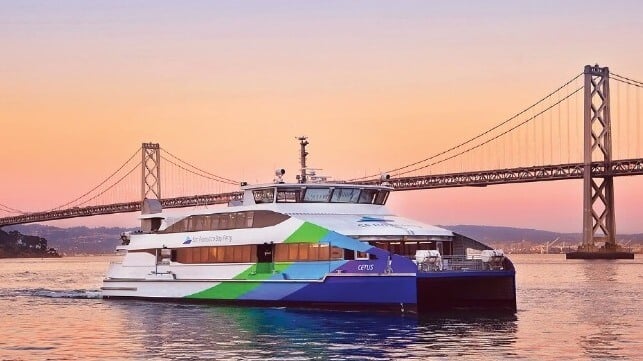SF Bay Receives Grant to Establish Battery-Electric Ferry Network

California is awarding a grant to support the development of one of the nation’s first high-frequency electric ferry networks servicing the fast-growing neighborhoods around San Francisco. The grant is the latest in a series of steps being taken to support the development of the San Francisco Clean Ferry Network, which is designed to be a major milestone in the efforts to transform to zero-emission ferry service in the region.
The California State Transportation Agency (CalSTA) awarded a $14.9 million grant to the San Francisco Bay Area Water Emergency Transportation Authority (WETA). Tracing its roots back more than 20 years, WETA was tasked by the California State Legislature with planning new and expanded ferry service in the region. A decade ago, WETA absorbed the ferry services previously run by the Cities of Alameda and Vallejo, starting efforts to expand and enhance service in the region.
“San Francisco’s waterfront is home to some of the region’s fastest-growing new neighborhoods and this grant will help reduce traffic and improve air quality by connecting workers and residents with the country’s first high-speed, zero-emission ferry service,” said WETA Board of Directors Chair Jim Wunderman.
The grant will fund the construction of battery-powered ferries and shoreside charging infrastructure to support the San Francisco Clean Ferry Network, which will connect waterfront San Francisco neighborhoods including Downtown, Treasure Island and Mission Bay. According to WETA, they plan to use the grant to fund the construction of a third vessel for what will eventually be a four-vessel network. The grant also includes funds for the charging infrastructure needed to operate the service.
The agency is currently completing a two-pronged study investigating both clean marine propulsion technology and shoreside infrastructure needs that will inform policy decisions going forward. Under the agency’s long-term plan, ferries aging out of San Francisco Bay Ferry service will be replaced with new zero-emission vessels. WETA may also convert some current ferries to zero-emission propulsion systems over the next decade. WETA has taken delivered on eight new ferries with a combined 3,255 seats since 2017, with three more vessels currently under construction.

that matters most
Get the latest maritime news delivered to your inbox daily.
The new grant, which was awarded through CalSTA’s Transit and Intercity Rail Capital Program (TIRCP), is the latest in a series of grant awards that have been secured to support the new service. In 2020, WETA was awarded $9 million from CalSTA to design and build its first zero-emission ferry along with shoreside infrastructure. In early 2022, WETA won a $3.4 million Federal Transit Administration (FTA) grant to add an additional battery-electric vessel to the network.
The agency is moving forward with its strategy for the zero-emission ferry network as it also works to build back its service and ridership after the pandemic. In 2019, WETA served a record 3.2 million passengers and with a newly launched Pandemic Recovery Program in July 2021 WETA created sustained ridership growth, positioning San Francisco Bay Ferry as the regional system with the highest percentage of pre-pandemic ridership. By the end of 2021, they have recovered to over 100,000 passengers boardings each month and San Francisco Bay Ferry’s ridership reached 63 percent of pre-pandemic levels in June 2022.
